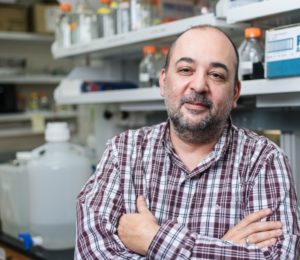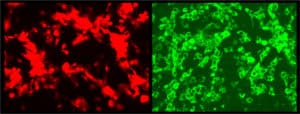Intensive project also will speed research for viruses with the potential to cause future pandemics.
SAN ANTONIO (July 14, 2022) – As the coronavirus waves keep coming and cases are on the rise once again, the National Institutes of Health (NIH) recently launched a $577 million effort to develop antivirals against COVID-19 and other viruses with high pandemic potential.

Texas Biomedical Research Institute Professor Luis Martinez-Sobrido, PhD, an expert in virology, vaccines and antiviral research, has been recruited to collaborate with three of the nine Antiviral Drug Discovery (AViDD) Centers for Pathogens of Pandemic Concern announced this spring. Dr. Martinez-Sorbrido has more than 25 years of experience working on numerous viruses, from influenza, coronavirus, hemorrhagic fever viruses, and developing vaccines and antiviral therapies against them.
NIH’s National Institute of Allergy and Infectious Diseases (NIAID) is funding the AViDD centers over the next three years. The specific goals and research of each center will vary, but priority has been placed on developing antivirals that can be taken in an outpatient setting. Dr. Martinez-Sobrido and his laboratory will be working with the Center for Antiviral Medicines & Pandemic Preparedness at Scripps Research Institute in La Jolla, California; the Antiviral Countermeasures Development Center (AC/DC) at Emory University and Georgia State University in Atlanta; and the QBI Coronavirus Research Group Pandemic Response Program at University of California, San Francisco.
Richard Plemper, PhD, a professor at Georgia State University is co-principal investigator of the center delightfully known as AC/DC, with George Painter, PhD, a professor at Emory University. Dr. Plemper is a long-time collaborator with Dr. Martinez-Sobrido and recruited him to be part of AC/DC.
“We have identified a group of foremost subject experts on viral pathogens and pioneers in new, advanced methodology,” Dr. Plemper says in a press release from Georgia State University. “This formidable group is a major strength of the center. Drug development literally takes a village, and what we have brought together are leaders in this village who can move things forward.”
Dr. Martinez-Sobrido and his lab members will bring their expertise in developing fluorescent reporter viruses to easily identify and characterize drugs with broad antiviral activity. The modified SARS-CoV-2 reporter viruses glow, making it far easier and faster to screen a large array of antiviral candidates. The glowing reporter viruses make it possible to physically see which antivirals are effective and which are not. Simply put, no glowing = no virus present = antiviral worked.

Using reverse genetics approaches developed in his laboratory, Dr. Martinez-Sobrido and his team will also generate certain SARS-CoV-2 variations containing different mutations to better understand how antiviral drugs interact with the virus, and to assess the potential for the mutations to escape the antivirals.
“We want to make sure the virus cannot escape, rendering the new drug ineffective,” Dr. Martinez-Sobrido says. “Part of the strategy will be to develop and test drugs that target two or more different mechanisms against the virus. That way we can begin to expand the options available to attack this and future coronaviruses.”
Martinez-Sobrido Lab members who will participate in the AViDD projects include Staff Scientist Chengjin Ye, PhD; post-doctoral fellow Ahmed Khalil, PhD; research associate Elizabeth Holguin; and UT Health San Antonio graduate students Ramya Sithaveni Barre, Desarey Morales Vasquez, Nathaniel Jackson and Kevin Chiem.
When announcing the AViDD centers in a press release, NIAID Director Anthony S. Fauci, MD, stressed that the ongoing pandemic has underscored the need for a wider variety of treatment options, especially antiviral drugs that can be taken at home when symptoms are mild.
“Decades of prior research on the structure and vulnerabilities of coronaviruses greatly accelerated our response to the COVID-19 pandemic and we hope that similar research focused on antivirals will better prepare us for the next pandemic,” Fauci says.
###
ABOUT TEXAS BIOMED
Texas Biomed is one of the world’s leading independent biomedical research institutions dedicated to eradicating infection and advancing health worldwide through innovative biomedical research. Texas Biomed partners with researchers and institutions around the world to develop vaccines and therapeutics against viral pathogens causing AIDS, hepatitis, hemorrhagic fever, tuberculosis and parasitic diseases responsible for malaria and schistosomiasis disease. The Institute has programs in host-pathogen interactions, disease intervention and prevention, and population health to understand the links between infectious diseases and other diseases such as aging, cardiovascular disease, diabetes and obesity. For more information on Texas Biomed, go to www.TxBiomed.org.